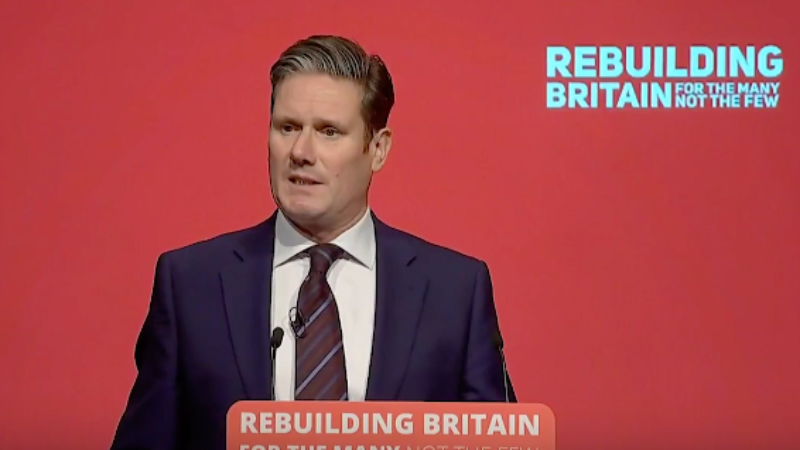
Keir Starmer can fairly be described as the frontrunner in Labour’s leadership contest. As well as gaining the endorsements of UNISON, Usdaw and Community trade unions, plus a number of affiliate organisations, he has won support from 311 local parties. That is over 58% of the total CLP nominations that have come in so far.
He has played it very safe so far in the race, and you might assume that he would continue to do so. But his list of ten policy pledges released today has provoked some criticism in Labour circles on social media – both because of what they did include and what was missed out.
Those most keen on the immigration motion that passed at Labour conference – advocating the extension of free movement, amongst other things – have been critical of the voting rights pledge. Labour’s 2019 manifesto would have seen all UK residents enfranchised, but Starmer is only promising to extend voting rights to EU nationals.
Perhaps more surprisingly, the ten pledges have come under fire by Corbynsceptics who would typically be expected to back Starmer for the leadership – and be excited, even, that the so-called ‘continuity Corbyn’ candidate isn’t in the lead. And yet high-profile figures from David Aaronovitch to Ayesha Hazarika have been vocally disappointed.
The promise to keep Labour’s current policy on university tuition fees – i.e. scrapping them altogether – is one of the policies doing most to rile up critics. That applies particularly to those invested in defending the New Labour years, under which fees were introduced before being trebled by the coalition government.
But the pledge that has caused most concern, or even simply confusion, is the specifics of Starmer’s vow to ‘promote peace and human rights’. As well as “no more illegal wars”, which is clearly phrased to reference Tony Blair’s Iraq intervention, the frontrunner talks of introducing a “Prevention of Military Intervention Act”.
The name of this proposed piece of legislation has raised some eyebrows. “At least call it “Abandon Sierra Leoneans, Kosovars and Kurds Act”,” John Rentoul tweeted. “What does that even mean?” asked James Bloodworth.
It is not explained in the press release or accompanying comments from Starmer, but this is what he recently specified on The Andrew Marr Show: “I would pass legislation that said military action could be taken if first the lawful case for it was made, secondly there was a viable objective and thirdly you got the consent of the Commons.”
This approach, focussed on legal criteria rather than more political priorities, is likely to characterise Starmer’s leadership if he wins on April 4th. It reminds us that he opposed the Iraq war on the basis that it was “not lawful under international law because there was no UN resolution expressly authorising it”.
The requirement to gain the consent of MPs through a Commons vote would formalise what is currently only an acknowledged convention. We don’t yet know the details of what will constitute ‘making the lawful case’ nor a ‘viable objective’. But the proposal doesn’t seem to have an in-built assumption against all types of intervention, despite its title. It only seeks to establish reasonable hurdles.
This development is a vindication of Richard Burgon’s proposal to ballot members on military action – his announcement has clearly shaped the main leadership contest let alone the deputy race. And yet, at the same time, Starmer’s pledge isn’t as strident as its name might have you believe.




More from LabourList
‘Labour won’t stop the far right by changing leaders — only by proving what the left can deliver’
‘Cutting Welsh university funding would be economic vandalism, not reform’
Sadiq Khan signals he will stand for a fourth term as London Mayor